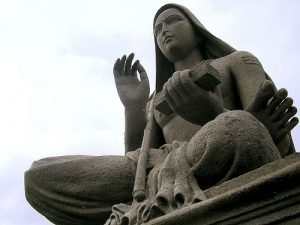Talk: Adi Shankaracharya’s Jnana Yoga
– Br. Shankara
January 6, 2019
Click for NOTES & QUOTES from the talk (PDF)
 January is a month for study of Jnana Yoga (Advaita Vedanta). As a jnana yogi, you practice discrimination, reason, detachment, and satyagraha (insistence on Truth). Your goal is freedom from limitation (mukti). Our teachers say that all miseries in life are caused by seeing inaccurately. An earnest and persistent jnani may break through this misapprehension (maya) and see only the Divine Presence everywhere, in everything and everyone.
January is a month for study of Jnana Yoga (Advaita Vedanta). As a jnana yogi, you practice discrimination, reason, detachment, and satyagraha (insistence on Truth). Your goal is freedom from limitation (mukti). Our teachers say that all miseries in life are caused by seeing inaccurately. An earnest and persistent jnani may break through this misapprehension (maya) and see only the Divine Presence everywhere, in everything and everyone.
Adi Shankaracharya (Shankara) was a great sage of 8th and 9th Century India (788-820 CE). Though only 32 at his death, he wrote highly revered interpretations of many traditional Hindu scriptures, including the Upanishads and other Vedantic texts. Shankara also left us books of instruction such as Vivekachudamani (Crest Jewel of Discrimination).
His efforts, including an ability to defeat leaders of other philosophical schools in debate, helped change the spiritual thought current of medieval India.
During the 9th Century, time-honored customs of Indian religious life had been fragmented or discarded. Materialism, mercenary priestcraft, superstition, and bigotry were prevalent.
Shankara and his disciples helped restore non-dual (Advaita) Vedanta and the Vedic scriptures to their former prominence in Hinduism’s Perennial Philosophy (Sanatana Dharma).
In this talk we define and discuss two practices that are central to Shankara’s teachings: viveka (discrimination between the unreal and the real), and vairagya (release of worldly desires and attachments).
Shankara says that — with sustained attention — discrimination and release will certainly lead an aspirant forward in spiritual life. And so, at last, to realization and life as a jivanmukta — one who is liberated while still embodied.